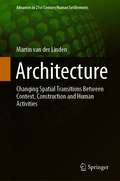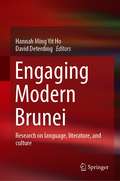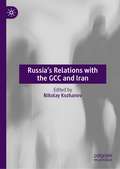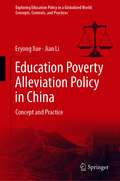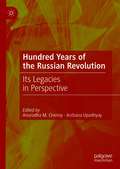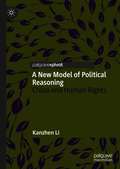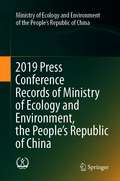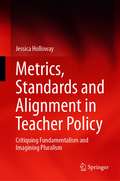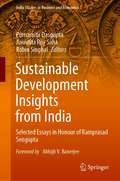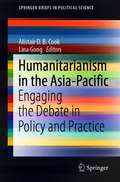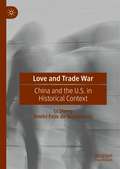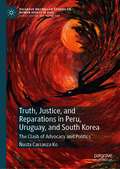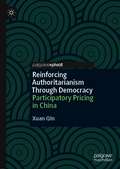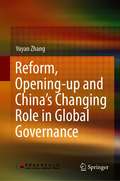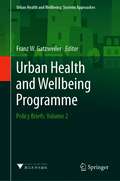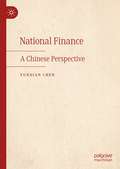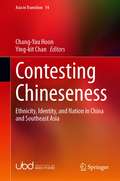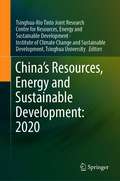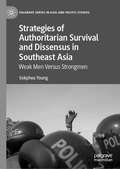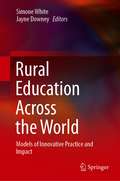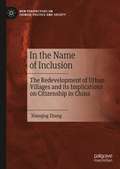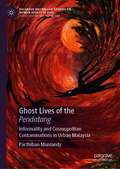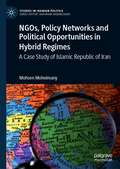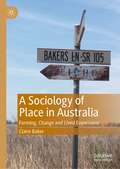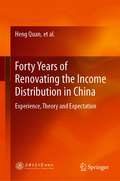- Table View
- List View
Architecture: Changing Spatial Transitions Between Context, Construction and Human Activities (Advances in 21st Century Human Settlements)
by Martin van der LindenThe question of what architecture is answered in this book with one sentence: Architecture is space created for human activities. The basic need to find food and water places these activities within a larger spatial field. Humans have learned and found ways to adjust to the various contextual difficulties that they faced as they roamed the earth. Thus rather than adapting, humans have always tried to change the context to their activities. Humanity has looked at the context not merely as a limitation, but rather as a spatial situation filled with opportunities that allows, through intellectual interaction, to change these limitations. Thus humanity has created within the world their own contextual bubble that firmly stands against the larger context it is set in. The key notion of the book is that architecture is space carved out of and against the context and that this process is deterministic.
Engaging Modern Brunei: Research on language, literature, and culture
by Hannah Ming Yit Ho David DeterdingThis book explores issues shaping and defining modern Bruneian identity. It addresses the research gap regarding Brunei studies in terms of the language, literature, and culture of Brunei which, with its bilingual education, is uniquely positioned at the intersection of the Malay and western worlds. The book analyses the linguistic, literary, and cultural modes that provide the backdrop for modern-day instantiations of local identity, as expressed through printed and online materials, film, art, and social practices. It compares Brunei English and Brunei Malay in the context of the literature and culture of Brunei.Readers will find it useful as an essential resource for academic scholars, university students, and others interested in the study of Brunei Darussalam's language, literature, and culture. It provides critical insights from an insiders' perspective into the local identity of the culturally diverse Bruneian society.
Russia’s Relations with the GCC and Iran
by Nikolay KozhanovThis book offers insight into the motives behind Moscow’s behaviour in the Persian Gulf (with a specific focus on the GCC member states and Iran), considering Russia’s growing role in the Middle East and its desire to protect national interests using a wide range of means. The book explores the drivers and motivations of the Russian foreign policy in the Gulf region, thus, helping the audience to generate informed prognosis about Moscow’s moves in this area over the next years. In contrast to most studies of Russia’s presence in the region, this book considers the Russian involvement in the Gulf from two standpoints – the Russian and foreign. The idea of the book is to take several key problems of Moscow’s presence in the Gulf, each of these to be covered by two authors—Russian and non-Russian scholars, in order to offer the readers alternative visions of Moscow’s policies towards Iran and the GCC countries
Education Poverty Alleviation Policy in China: Concept and Practice (Exploring Education Policy in a Globalized World: Concepts, Contexts, and Practices)
by Eryong Xue Jian LiThis book explores the education poverty alleviation policy in China from the perspectives of concept and practice. In this book, the authors also examine the major national education poverty alleviation policy to analyze the different periods and stages of education in China. This book also explores the development of China’s education poverty alleviation policy from different scopes. It examines the various stages, features, problems and suggestions in Chinese poverty alleviation progress.The intended readers are scholars and researchers who are interested and work in research of the poverty alleviation education in Chinese context, and also the administrators and stakeholders in Chinese poverty alleviation education management and graduate students who majoring and minoring in the field of anti-poverty education.
Hundred Years of the Russian Revolution: Its Legacies in Perspective
by Anuradha M. Chenoy Archana UpadhyayThe book reflects upon the Russian Revolution of 1917 and the ensuing developments in Russia, the rest of the former Soviet Union, Central and Eastern Europe and elsewhere in the world. It discusses the impact of the legacies of the Russian Revolution on political systems, ideologies, economic and social structures and culture. The book answers some pertinent questions: To what extent are these legacies relevant today for the contextualisation of memory politics, social institutions, and international relations? How does an analysis of 1917 and its legacies contribute to the comparative study of revolutions and social change?
A New Model of Political Reasoning: China and Human Rights
by Kanzhen LiWhy politics and international relations “seem” to be driven by power/strategies in some conditions but “seem” to be attached to values/beliefs in other situations? Based on findings in (political) psychology and international relations, the book builds a new political reasoning model: a two-layered motivation-heuristic complex. The model grasps the internal mechanism that drives the co-existent and dynamic relationship between material and ideational considerations in making political choices/phenomena diverse and evolving across situations and periods. Applied to the case of China and human rights, the model helps understand several questions that attract those who are interested in the topic: e.g., the roots and contents of strategic and conceptual factors that continuously influence China’s human rights idea/policies; if, why and how the strategy-ideational relationships in such idea/policies evolve across periods; and the role that China's national security condition and external pressure play during such evolving relationships.
2019 Press Conference Records of Ministry of Ecology and Environment, the People’s Republic of China
by Rong WangThis book introduces the press release work carried out by Ministry of Ecology and Environment of the People’s Republic of China in 2019. It is divided into four parts, each arranged chronologically. The first part contains the records of Li Ganjie, Minister of the Ministry of Ecology and Environment, who attended the press conference on "Promoting Ecological Civilization and Building a Beautiful China". The second part contains the records of Minister Li Ganjie's attendance at the press conference of the National People's Congress and the Chinese Political Consultative Conference as well as the "Minister channel". The third part contains the records of four press conferences on ecological and environmental protection held by the State Council Information Office of the People's Republic of China. The fourth part contains the records of 12 regular press conferences held by the Ministry of Ecology and Environment.
Metrics, Standards and Alignment in Teacher Policy: Critiquing Fundamentalism and Imagining Pluralism
by Jessica HollowayThis book looks at the narrowing effects of contemporary modes of teacher and teaching policy and governance. It draws on political theory to provide new ways of conceptualising the effects of teacher and teaching policies and practices. It adds a new dimension to the robust body of literature related to teacher policy by looking at three interrelated domains: (1) teacher preparation and development, (2) teacher evaluation and (3) teacher leadership.Drawing from case studies from the USA, UK and Australia, it illustrates how a coalescence around metrics, standards and compliance is producing increasingly restricted notions of teachers and teaching. It shows how the rationalities and techniques associated with accountability and standardisation are limiting the possibilities for multiple conceptualisations of teaching and teachers to exist or emerge. Using pluralism as the main framework, it challenges the dangers associated with rigid compliance and alignment and argues that pluralism can help secure schools as socially and culturally responsive to the needs of the community.
Sustainable Development Insights from India: Selected Essays in Honour of Ramprasad Sengupta (India Studies in Business and Economics)
by Purnamita Dasgupta Anindita Roy Saha Robin SinghalThis volume is a collection of essays that provide a comprehensive coverage of multiple aspects of the discourse on environment, development and sustainability. It is designed to bring in a host of perspectives highlighting the synergies and the trade-offs in this debate, showcasing research along with policy implications of putting research into use.The global discussion on sustainability paints the broad canvas for this book. This volume aims to probe some contemporary issues that will help in understanding the sustainability narrative in India. The topics span over a host of questions on energy, environment, natural resources and related constituents of development. The discourse further extends to the role of economic modelling, public policy debates, political intervention, stakeholders’ response, community participation and so on. The discussions are often based on empirical support, review of existing literature as well as policy analysis. With an ultimate aim to understand the overall development narrative of the people of India, the discourse takes in its ambit the nuances of resource utilisation, economic growth, COVID-19 impacts, competitiveness and market structures, urbanization, sectoral reforms, environmental hazards, climate change, pollution, natural resource accounting and management to name a few.The book is divided into four sections, namely, The Big Picture: Evolving Perspectives; The Energy Scenario: Dilemmas and Opportunities; Sustainability Cross-Cuts: Developmental Aspects and Externality Empirics: Knowledge and Practice. The first section contains commentaries on the overarching themes of economic growth, development and sustainability. It presents some emerging perspectives on the developmental crisis that has emerged through the environmental lens with additional focus on the need for inclusion of creativity, knowhow, technology and financial resources to achieve the ambitious SDG targets. The second section brings out the dilemmas and opportunities in the energy sector, that has been a key player in discussions of sustainability, especially for India where significant technological advances in conventional forms of energy supply coexists with fairly low levels of per capita energy consumption and energy security is a key challenge. The section on sustainability crosscuts attempts to highlight the problems and processes of mainstreaming the sustainability question into conventional thinking through the concepts of a circular economy, green accounting techniques, institutional and governance structures, public policy and inclusive growth, amongst others. The last section presents some empirical studies on environmental externalities, the unaccounted environmental effects of economic production and consumption and finally the behavioural aspects of the stakeholders that are crucial in the larger narrative of sustainable development.This edited volume contains contributions of reputed scholars from various Indian universities, research institutions and professionals from outside academia, who are proven experts in their fields. The link between policy, practice, and well-being of the large vulnerable population of India is the major focus of enquiry that will help researchers, practitioners and policy planners in conducting further research in energy, environment, resource and linked areas of development economics. General readers with an active interest in energy, environment, and economic development are also likely to find this book an interesting read, especially in the times of several environmental challenges facing humankind.
Humanitarianism in the Asia-Pacific: Engaging the Debate in Policy and Practice (SpringerBriefs in Political Science)
by Alistair D. B. Cook Lina GongThis collection offers insights of the international humanitarian system, considering what constitutes humanitarianism in Asia-Pacific, and how it shapes policy and practice in the region and globally. It adds to the conversation on reforming the global humanitarian system by providing the space to share perspectives on humanitarian action from our place in the world. The authors answer these questions by focusing on a range of issues from national to sectoral perspectives to relations between ‘traditional’ and ‘emerging’ players, concluding that the dynamics of the humanitarian system from the perspectives of the Asia-Pacific are rooted in their localized experiences and built outwards. The first significant trend is that understandings of humanitarianism in the Asia-Pacific are primarily shaped by the experience of disasters at home. Second, national governments play a dominant role in humanitarian affairs in the region. Finally, the humanitarian landscape in the Asia-Pacific constitutes a diverse yet under-appreciated set of actors. This book is based on the RSIS Conference on Asia and the Humanitarian World held in 2019 in Singapore. It is relevant to students, scholars, practitioners and policymakers with an interest in humanitarian assistance, disaster management, strategic studies and international relations in Asia-Pacific.
Love and Trade War: China and the U.S. in Historical Context
by Dmitri Felix do Nascimento Li ShengThis book puts the trade war between the United States and China in historical context. Exploring the dynamics of isolation and internal reform from a Chinese perspective, the author draws upon valuable insights from China's years of isolation prior to the famous Nixon-Mao summit. Advocating internal reform as a more productive strategy than conflict with other powers, this powerful argument for globalization with Chinese characteristics will be of interest to scholars of China, economists, and political scientists.
Truth, Justice, and Reparations in Peru, Uruguay, and South Korea: The Clash of Advocacy and Politics (Palgrave Macmillan Studies on Human Rights in Asia)
by Ñusta Carranza KoThis book presents the first cross-regional analysis of post-transitional justice periods and the conditions that influence states’ behaviors. Specifically, the book examines why states that adopt and ostensibly implement transitional justice norms as policies—criminal prosecutions, reparations policies, and truth commissions—fail to follow through with their recommendations. Applying these perspectives to a comparative study of states from Latin America and East Asia—namely, Peru, Uruguay, and South Korea—which accepted and implemented transitional justice norms but took different trajectories of behavior after the implementation of policies, this book contributes to understanding the relationship of norm influence on states and why states change in compliance after norm adoption. The book explores the conditions that contribute or limit the continued respect for transitional justice norms, emphasizing the political interests and transnational advocacy networks’ roles in affecting states’ policies of addressing past abuses.
Reinforcing Authoritarianism Through Democracy: Participatory Pricing in China
by Xuan QinThis book provides empirical evidence to show how democratic experiments are harnessed to achieve control and support authoritarianism, through the lens of participatory pricing, which is one of the most important forms of deliberative democracy in China. The crucial point is an interlacement of easily perceptible improvement in empowerment (voluntary enrollment, disclosure of information and opportunities for expression during events) and hidden control (delicately designed procedures and pre-existing frameworks that influence participants in how they think, and when they talk).The mixture of these two mechanisms assures participants and educates them, producing cooperative citizens desired by the government. This is referred to as the partial empowerment strategy, which challenges the traditional assumption of the correlation between deliberation and empowerment. When authoritarian control influences deliberations in a form that obstructs the natural developmental process of empowerment, it acts as a filter that encourages only some form of empowerment, but precludes those that are too risky for the government. This exertion of dominance through a participatory form reflects the development of governance capability of China as a modern authoritarian state and explains its “surprising” resilience.
Reform, Opening-up and China's Changing Role in Global Governance
by Yuyan ZhangThis book looks back to 40 years ago for the whole history of China’s reform and opening-up and focuses on the role change of China in the relationship with outside world. In the first half part, the author explores China’s economic reform and opening-up policy from theoretical analysis and systematic interpretation. In the second part, the author aims to present how China’s international roles have changed in recent years and the Chinese appeal and purpose of participating in and improving global governance procedure. The author answers the question of why China has obtained miraculous achievements after its reform and opening-up from academic perspective and provides representative cases with profound but not obscure theoretical interpretation. It is a must-read for anyone who is interested in contemporary China’s economy and foreign affairs.
Urban Health and Wellbeing Programme: Policy Briefs: Volume 2 (Urban Health and Wellbeing)
by Franz W. GatzweilerThis book is a collection of policy briefs produced from research presented at the 16th Conference on Urban Health in Xiamen, China, November 4–8, 2019, under the theme “People Oriented Urbanisation: Transforming Cities for Health and Well-Being”, co-organized by the Urban Health and Wellbeing (UHWB) programme of the International Science Council (ISC). The UHWB programme takes an interdisciplinary, cross-sectoral and systemic view on issues of health and wellbeing in cities which include the urban economy and finance systems, education, employment, mobility and transport, food, energy and water resources, access to public services, urban planning, public spaces and urban green, as well as social inclusion. Contributions to this book have been made by scientists from multidisciplinary research fields. The policy briefs in this book present the background and context of an urban health issue, research findings and recommendations for policy/decision-makers and action-takers. In some cases, they inform about relevant events and developments from the science community or important opinion pieces which address health emergencies, like the current COVID-19 pandemic. The book is intended for citizens and political decision-makers, who are interested in systems perspectives on urban health and wellbeing, examples of how to deal with the increasing complexity of cities and the accompanying environmental and social impacts of increasing urbanization. Furthermore, it hopes to inspire decision-makers to facilitate finding solutions, in order to reach the goal of advancing global urban health and wellbeing.
National Finance: A Chinese Perspective
by Yunxian Chen“National finance” is a new concept launched by the author in his book National Finance ─ A Chinese Perspective, a unique monograph that differs from other financial publications dealing with general topics in public finance. The monograph intends to provide a full, well-developed and macro-level exposition of all major aspects of finance from the perspective of the central government, with focus laid on the most essential, immediate and intricate issues in national financial development, which are the "hard nuts" that have to be cracked on both central and regional levels and on the fronts of both offshore and onshore finance. It attempts to cope with a series of formidable challenges that a country, particularly its top government officials, must take in developing finance: how national finance should develop and overtake in the face of rising financial industries, how it should respond to the influx of AI+blockchain technologies, how a country guards against and copes with systematic or regional financial risks with security, fluidity and profitability serving as its cornerstones, how it can build up and promote the new international financial system and governance amid international financial powers around the world, and so on.
Contesting Chineseness: Ethnicity, Identity, and Nation in China and Southeast Asia (Asia in Transition #14)
by Chang-Yau Hoon Ying-Kit ChanCombining a historical approach of Chineseness and a contemporary perspective on the social construction of Chineseness, this book provides comparative insights to understand the contingent complexities of ethnic and social formations in both China and among the Chinese diaspora in Southeast Asia. This book focuses on the experiences and practices of these people, who as mobile agents are free to embrace or reject being defined as Chinese by moving across borders and reinterpreting their own histories. By historicizing the notion of Chineseness at local, regional, and global levels, the book examines intersections of authenticity, authority, culture, identity, media, power, and international relations that support or undermine different instances of Chineseness and its representations. It seeks to rescue the present from the past by presenting case studies of contingent encounters that produce the ideas, practices, and identities that become the categories nations need to justify their existence. The dynamic, fluid representations of Chineseness illustrate that it has never been an undifferentiated whole in both space and time. Through physical movements and inherited knowledge, agents of Chineseness have deployed various interpretive strategies to define and represent themselves vis-à-vis the local, regional, and global in their respective temporal experiences. This book will be relevant to students and scholars in Chinese studies and Asian studies more broadly, with a focus on identity politics, migration, popular culture, and international relations.“The Chinese overseas often saw themselves as caught between a rock and a hard place. The collection of essays here highlights the variety of experiences in Southeast Asia and China that suggest that the rock can become a huge boulder with sharp edges and the hard places can have deadly spikes. A must read for those who wonder whether Chineseness has ever been what it seems.” Wang Gungwu, University Professor, National University of Singapore. “By including reflections on constructions of Chineseness in both China itself and in various Southeast Asian sites, the book shows that being Chinese is by no means necessarily intertwined with China as a geopolitical concept, while at the same time highlighting the incongruities and tensions in the escapable relationship with China that diasporic Chinese subjects variously embody, expressed in a wide range of social phenomena such as language use, popular culture, architecture and family relations. The book is a very welcome addition to the necessary ongoing conversation on Chineseness in the 21st century.” Ien Ang, Distinguished Professor of Cultural Studies, Western Sydney University.
China’s Resources, Energy and Sustainable Development: 2020
by Tsinghua-Rio Tinto Joint Research Centre for Resources, Energy and Sustainable Development Institute of Climate Change and Sustainable Development, Tsinghua UniversityThis book explores sustainable development from the perspective of resources and energy, based on China’s practical experience and cross-disciplinary research. It focuses on major challenges, key solutions and policy recommendations, and studies and explores seven important themes of resources, energy and sustainable development, including: 1) China’s low-carbon energy transition, 2) China’s urbanization and low-carbon development, 3) China’s low-carbon action in cities, 4) China’s low-carbon power transition, 5) China’s water resources management, 6) electric vehicle development and key metal resources and 7) China’s low-carbon development of the iron & steel industry. This book contributes to a more integrated understanding of many themes and their relationships in the area of resources, energy and sustainable development and guides the related policy and management.
Strategies of Authoritarian Survival and Dissensus in Southeast Asia: Weak Men Versus Strongmen (Palgrave Series in Asia and Pacific Studies)
by Sokphea YoungThis book analyses how authoritarian rulers of Southeast Asian countries maintain their durability in office, and, in this context, explains why some movements of civil society organizations succeed while others fail to achieve their demands. It discusses the relationship between the state-society-business in the political survival context. As the first comparative analysis of strategies of regime survival across Southeast Asia, this book also provides an in-depth insight into the various opposition movements, and the behaviour of antagonistic civic and political actors in the region.
Rural Education Across the World: Models of Innovative Practice and Impact
by Simone White Jayne DowneyThis book brings together authors from United States, South Africa, United Kingdom, China, Canada and Australia to provide insights and case studies from across a range of contexts to explore the interplay between the notions of rurality, innovation and education. The book reveals a hopeful and resilient approach to innovative rural education and scholarship collectively and provides important evidence to speak against an often deficit view of rural education. Three patterns are revealed, namely: the importance of place-attentive strategies, the importance of joined up alliances to maximise resources and networks and finally, the need to utilize alternative methodologies and frameworks that have a starting point of difference rather than deficit for any rural initiative or approach. By drawing from international examples and responding in innovative ways to rural education challenges, this book provides an opportunity to share international insights into innovations, interventions and partnerships that promote and support rural education in its broadest sense.
In the Name of Inclusion: The Redevelopment of Urban Villages and its Implications on Citizenship in China (New Perspectives on Chinese Politics and Society)
by Xiaoqing ZhangThis book follows the citizenship-based approach and interrogates the policies on urban village redevelopment from a perspective of social exclusion and inclusion. It focuses on two questions: how policy makers and urban villagers understand social inclusion differently, and what makes a difference in enhancing social inclusion. Firstly, an examination of citizenship conceptions, as reflected in the Chinese traditional discourses, provides the basis for questioning the political rhetoric of social inclusion in China. Secondly, a comparison between policy makers’ and villages’ interpretations on urban citizenship helps explore the different understandings of citizenship between them. Finally, by studying six redeveloped urban villages in the city of Xi’an, the book identifies what villagers strive for, and discusses how their strivings make a difference in achieving social inclusion during urban village redevelopment.
Ghost Lives of the Pendatang: Informality and Cosmopolitan Contaminations in Urban Malaysia (Palgrave Macmillan Studies on Human Rights in Asia)
by Parthiban MuniandyThis book is an ethnographic study of migrants, refugees and ‘temporary’ people in Malaysia, incorporating narratives, personal stories, and observations of everyday life in Kuala Lumpur and Georgetown, Penang. Rather than focusing on specific migrant communities or refugee ‘camps’, the book takes subaltern cosmopolitanism as its central lens to look at how different and diverse communities of non-citizen ‘pendatang’ (aliens) co-habit, work and live together in Malaysia. Urban centers in Malaysia offer the space for informality that allow stateless and undocumented people to seek out opportunities, while also finding ways to assimilate or even ‘disappear’ into the fabric of society. The book focuses on the notion of ‘contaminations’, rather than migration or migrants, to underscore one of the most important findings of the ethnographic study – that migrant life in Malaysia is critically integral, embedded and interwoven into the everyday life in the city - shaping and affecting all aspects of daily life from production and supply chains, food service networks, cultural and religious practices, waste and recycling work, to more intimate and private contexts such as romantic relationships, family life and sex-work. Hybridity, inter-mixing and bastardization are part and parcel of everyday urbanism in KL and Penang – these ‘contaminating elements’ challenge and disrupt categories of the ‘national’ and categories such as insider/outsider, national purity, and politically constructed divisions between ethnic and racial groups. The book thus relies upon detailed ethnographic narratives curated over a decade of study, offering students interested in fieldwork research insights into the types of engagements and commitments necessary for helping build the complex, uneasy and destabilizing knowledge that characterizes critical ethnography.
NGOs, Policy Networks and Political Opportunities in Hybrid Regimes: A Case Study of Islamic Republic of Iran (Studies in Iranian Politics)
by Mohsen MoheimanyThis book discusses the diversity and resilience in a hybrid regime where civil society organisations are either provided with complex sets of opportunities or face severe constraints. By studying the case of Iran between 1997 and 2013, it shows how the Islamic Republic regime went into two opposite directions under two presidencies and played in-between supporting and suppressing advocacy NGOs. After accommodating a novel theoretical framework enabling scholars to identify the contributing factors of diversity in the regime, four case-study chapters are designated for comparing the women’s rights and environmental NGOs across local and national governments. These two political and technical policy areas demonstrate the different scopes of freedoms for advocacy NGOs. The contrasting narratives of the civil activists and policymakers imply paradoxes and shifts in the arrangement of opportunities for action and advocacy, although the leadership and structure of the regime remained unchanged during the period of study.
A Sociology of Place in Australia: Farming, Change and Lived Experience
by Claire BakerThis book weaves a social, economic and cultural history of Australia with rare first-hand accounts of the lived experience of change related to farming and agriculture. It provides a rich sociology of how living on the land has changed throughout Australia’s history. The book investigates the complex effects of the state on everyday life, using an historical agricultural case study of place to explore long-running sociohistorical processes of change examined through both a macro and micro sociological lens. This provides a multi-faceted perspective from which to examine economic, social and cultural transformations in each of these contexts and change is examined through multiple sites of expression: public policy and the role of the state; colonial processes of dispossession; social and cultural systems of value; economic change and its consequences; farming practices and lived experience; neoliberalism and globalisation and their social impacts; community decline and trends toward corporate and foreign land ownership. Each of these transformations impact upon lived experience and everyday life and this book provides grounded insight into exactly this relationship and process.
Forty Years of Renovating the Income Distribution in China: Experience, Theory and Expectation
by Heng QuanThis book focuses on an attractive theoretical subject as well as a practical issue, which analyses the inner relationship of economic growth and income distribution in China. During the forty years of China’s reform and opening up many influential changes occurred in the structure of the national income distribution, the mechanism of income distribution, and the policies of distributing income with the high-speed development of China. From historical and regional analysis, this book collects a good deal of data and objectively summarizes the practice and experience of renovation of income distribution in China. Based upon the summary and conclusion above, the book paraphrases and creates a conceptual mechanism, a basic theory, and a basic methodology of socialism with Chinese characteristics and discovers the internal rules of the changing relationship between high-speed economic development and income distribution in China to guide and facilitate the further improvement and innovative development of income distribution in China. Furthermore, the book enriches the political economy theory of socialism with Chinese characteristics in the aspect of practical experience, as well as theory.
